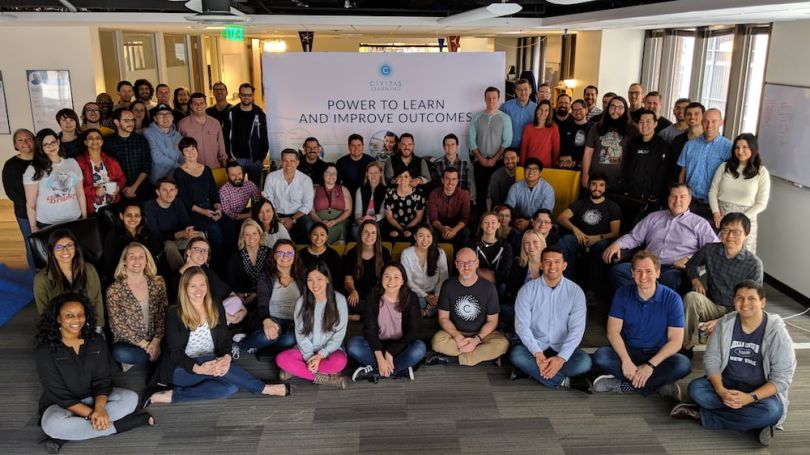One of the quickest ways for a company to fade into obscurity is to remain stagnant. This holds especially true for the tech industry, where companies are expected to adapt to trends at lightning speed. These six Austin companies are well aware of the consequences that come with getting too comfortable and have instead opted for a path of ongoing research and reinvention. Here’s how they stay ahead.

Edtech and big data firm Civitas Learning knows a thing or two about what’s working — and what’s not — in higher education. One major shift that co-founder and SVP of Product and Strategy Laura Malcolm noted is the industry’s move away from descriptive and predictive analytics in favor of prescriptive ones.
Our software packages sophisticated predictive models and analytics into intuitive, actionable insights for student support staff.”
How has Civitas Learning set itself apart as a leader in your industry?
With a rigorous focus on improving student success outcomes such as persistence and graduation rates. We do this by providing machine learning software and user-centered product design focused on driving and measuring those outcomes. In particular, our software packages sophisticated predictive models and analytics into intuitive, actionable insights for student support staff while also using proprietary statistical software to measure results by creating on-the-fly control groups.
What do you think will be the next big tech trend in your industry?
An emerging trend in the use of analytics in education is moving from descriptive and predictive to prescriptive analytics. There is a growing trend of institutions adopting and using predictive analytics software to support students, but they will not meet the full potential of the technology until software is prescribing the right actions, supports and interventions, based on what works. We are working directly with the market to not only understand the kinds of actions and supports that are available, but measuring them to understand what works, and for which students, so that effective prescriptions can be offered.

By building technology designed for convenience and personalization for its end users, MVF has established itself a leader in marketing tech. CEO of MVF U.S. Bjorn Zellweger highlighted what makes their platform unique and how MVF plans on staying ahead of the curve.
Our tech applications allow us to run over 40 marketing channels and carefully blend and control traffic.”
How has MVF set itself apart as a leader in your industry?
Our proprietary technology platform is what gives MVF its competitive edge. On the client side, our unique tech applications allow us to run over 40 marketing channels and carefully blend and control traffic to meet the requirements of our clients in terms of timing, volume and quality. For the customers we generate, our proprietary Capture platform enables us to optimize our forms in real time and interact with different buyer segments in the way that best suits their needs, including chatbots, SMS, email and on-form appointment booking.
What do you think will be the next big tech trend in your industry?
Using machine learning and data to enhance user experience and introduce more personalization is a key focus for us. We already have tech that is able to predict and tailor the way users interact with us, choosing the solution that best suits their requirements. Using the signals they send enables us to increase the quality of leads for our clients and help our users get their quotes in a truly personal way.
It’s a really exciting and constantly evolving area, and we’re investing in more types of personalization as the landscape of how users interact with technology continues to expand.

International real estate firm Keller Williams saw one its largest years of sales last year, thanks in part to its investment in technology. Neil Dholakia, chief product officer, said the secret sauce to its recent and future successes resides in its research and development processes within KW Labs, the company’s innovation hub.
We were the first in our industry to come to market with a fully connected, smart real estate cloud.”
How has Keller Williams set itself apart as a leader in your industry?
We were the first in our industry to come to market with a fully connected, smart real estate cloud that incorporates and manages all aspects of an agent’s business. What makes our platform smart is our proprietary, award-winning artificial intelligence layer, which we call Kelle. Our platform uses the latest in enterprise-level technology from microservices to progressive web apps on Google Cloud, all infused with artificial intelligence and machine learning.
What do you think will be the next big tech trend in your industry?
It’s all about platform integration in the real estate industry. We are focused on consolidating all aspects of the real estate transaction onto one platform, and that involves integrating with mortgage, title, insurance and property management companies to provide a seamless consumer experience within our ecosystem. We plan to get there first. And set the bar high.

Jason Vertrees, Volusion’s VP of engineering and data science, said their e-commerce platform is all about ease of use for the customer. While it looks simple on the front end, what’s happening under the hood is quite complex. Vertrees told us more about Volusion’s machine learning engine, which runs off 5,000 data requests per second.
Keeping things simple has helped Volusion grow throughout the years.”
How has Volusion set itself apart as a leader in your industry?
We’ve always focused tightly on making merchants — we call them “founders” — successful. Being a founder isn’t easy; we’re here to support them each step along their entrepreneurial path. Our platform is simple to use, so it reduces the cognitive load on busy founders just trying to get things done. Keeping things simple has helped Volusion grow throughout the years.
What do you think will be the next big tech trend in your industry?
Data-driven automation will continue to expand into commerce, further optimizing the shopper experience and increasing revenue. Volusion’s systems serve over 5,000 requests per second, providing enough data to fuel real-time machine learning applications which make recommendations back to our founders and shoppers. Data-driven insights, paired with automation, will free up merchants’ time for more important tasks, like focusing on the customer and getting the product right.

A customer-centric approach has helped identity governance provider SailPoint stand out in a sea of rising competition, said CMO Juliette Rizkallah. To stay on top, the Austin-based company, which launched in 2004, has implemented technologies like machine learning and AI into its solutions.
We are a customer-centric organization, and we keep a constant pulse on their needs as we evolve our products.”
How has SailPoint set itself apart as a leader in your industry?
SailPoint has been paving the way in identity governance for more than a decade. We have always set ourselves apart by understanding what customers need and delivering on it. Further, we are a customer-centric organization, and we keep a constant pulse on their needs as we evolve our products.
What do you think will be the next big tech trend in your industry?
Machine learning and artificial intelligence have evolved from buzzwords to reality in the tech and security industries. We are now seeing many of these technologies take off in today’s organizations. With our analytics solution, IdentityAI, we are enabling organizations to harness that technology in their identity programs, allowing them to govern their digital identities smarter.

The future of home buying will likely follow the habits and practices of millennials. With that in mind, Modernize VP of Engineering Andy Michaelis said his team continues to create products that cater to a generation that prefers to communicate online.
We build products to make working with contractors easier.”
How has Modernize set itself apart as a leader in your industry?
Home improvement projects can often be costly and stressful, so we build products to make working with contractors easier. A few years ago, we moved to an API-first infrastructure enabling us with Docker to automate our testing and feature branch deployments that now occur dozens of times a day. This foundation has enabled us to quickly innovate on our products, providing homeowners with tools like cost calculators, contractor feedback, profiles and enabling the matching process to be as frictionless as possible.
What do you think will be the next big tech trend in your industry?
I think as millennials start to purchase their first homes, they are going to be more tech savvy than we’ve ever seen before. We continue to build products that work for them based on how they want to be communicated with, and enable everything from texting with contractors to booking an entire roof replacement online.





